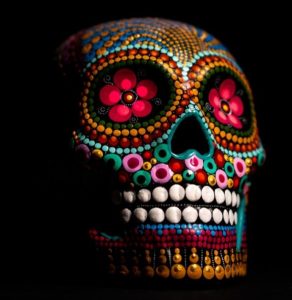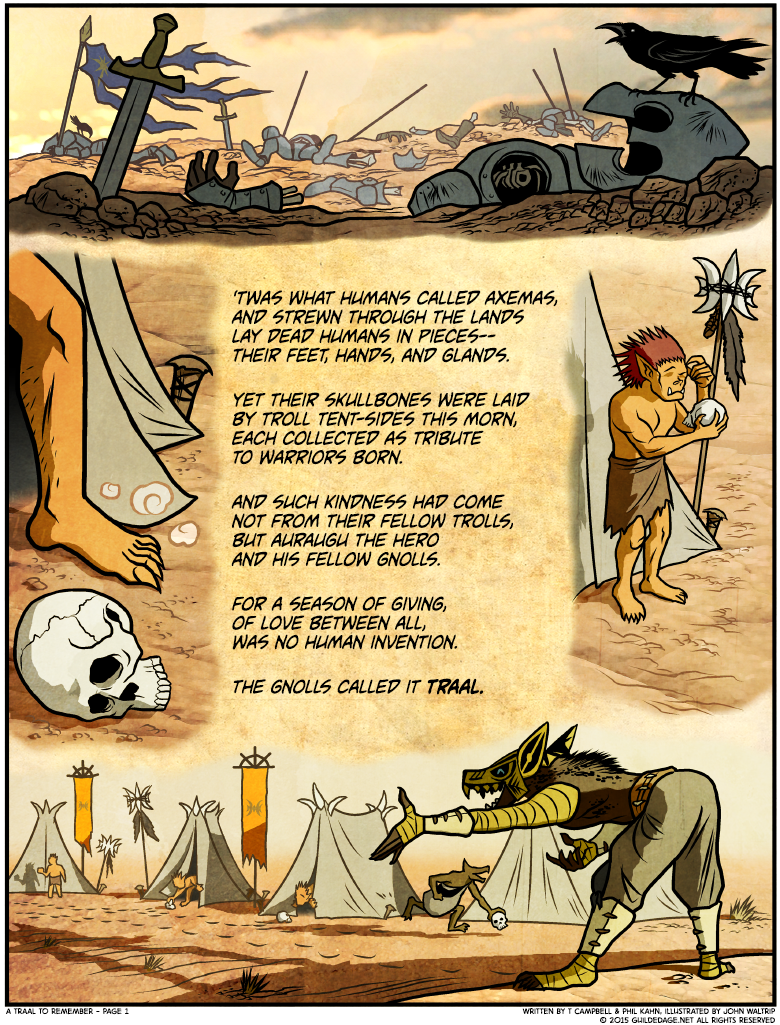Traal Anno 1
 Flo knew the magic words to interest me in almost any story idea were “I think we need a verse opener.” Frankly, the fact that “trolls” rhymes with “gnolls” had been striking me as some kind of missed opportunity for years.
Flo knew the magic words to interest me in almost any story idea were “I think we need a verse opener.” Frankly, the fact that “trolls” rhymes with “gnolls” had been striking me as some kind of missed opportunity for years.
Early on, we considered saying that the gnolls were borrowing Axemas traditions from the humans, or vice versa, but I think I like the ambiguity here better. One thing you learn quickly as a writer is that people often come up with good ideas independently of each other. “The days are as short as they’ll ever get, let’s celebrate” is, I think, an impulse common to sentient biology.
The awkwardness of celebrating Christmas with your Jewish friends can be real sometimes, but I generally got gifts for them and asked them to understand it was part of my culture and I expected nothing back. A giving day is not something to view in narrowly transactional terms! None of them felt awkward about it (and it wasn’t like I was buying them yachts or anything), but if they had, I would’ve said, “Hey, just get me something nice for my birthday.” And my birthday’s in October, plenty of time after Christmas for me to forget what I got anyone anyway.











The poem was (and still is) really a nice way to evoke the holiday-spirit.
Not having humans and/or gnolls appropriate the holiday from the other party, but having gotten to the same conclusion by their own means/reasoning, really helped to further highlight the communalities that all races have with each other.
I don’t grasp why skulls would be considered nice gifts, as such.
To display as a war trophy. Supposed to contain the enemy’s life force. Obviously, the gnolls attach more meaning to it than the trolls do.
Also, terrific decorative value! Greatly enhances the atmosphere of your room!
‘Rejoice! This guy’s dead, and you are not!’
Everyone needs a drinking cup!
…what, what do you make yours out of?
On an unrelated note:
“Frankly, the fact that “trolls” rhymes with “gnolls” had been striking me as some kind of missed opportunity for years.”
In Basic/Rules Cyclopedia D&D, gnolls are magical constructs created by an evil magic-user combining a gnome with a troll.
Yes, I am perfectly serious. Check the monster description for yourself.
“Love between all” and gifting the skulls of freshly slain humans to the those who did the slaying … I sense a little inconsistency there.
…which is actually perfectly in line with Christian traditions, which include universal forgiveness, unquestioning love for the greatest sinner and strict non-violence as well as crusades, conquista, the invention of witch hunts and massive child abuse. It would probably look a little unrealistic if Gnolls assumed “Love for all” to include humans by default.
As someone who despises organised religion as the source of most of the strife in the world throughout history, I think that in the particular cases you cite, there should be a distinction made between the religion/belief system itself, and the structure of the church that grew up around it to propagate and protect the belief system. The organisation that is the church needs to promote itself as the one true mouthpiece of the religion, taking that title away from the ruler, and to protect itself from the ruler’s retribution for that fact.
While wars (and all their resultant misery – plague, famine, unwanted children, shattered families, general destruction) in general have usually been motivated by greed, they have been sold to the people who do the actual fighting as, “we are X, they are not, therefore anything we do to them is right and just and you will be rewarded in the afterlife for your devotion to spreading X.” But it’s the rulers who do that selling. In cases where the ruler – for most of history, the embodiment of the religion’s supreme being(‘s will) – sees no profit in having a war, but the church does (such as for a crusade), the church does the selling, adding further incentives regarding not being held culpable for sins while on their “holy mission”, and so on. This not only gets the church what it wants, it also solidifies the church organisation’s power base to persuade the ruler to do more of what they want, or, y’know, there’s a couple of thousand battle-hardened crusaders just hanging around right now, it would be a shame if they got it into their head that taxing the church was unholy, wouldn’t it, sire?
Witch hunts are the church organisation clamping down on a threat to their power base – people in rural communities are only supposed to get their advice, news, and remedies from the church; that way the church can control what they know and can expect to be gratefully left more money in their will. If some little old lady comes along with a herbal remedy or traditional folk wisdom that works where prayer and donations don’t, that’s a threat to the church organisation being seen as the only true source of accurate information. If their advice about planting certain crops in a certain field turns out to be wrong, it’s a ready-made excuse to encourage the people to be more pious. If there’s someone not in the church hierarchy offering conflicting advice that turns out to be right, they must be in league with the religion’s adversary and the extent of their corruption must be rooted out and purged! Unspoken: “to protect the church’s image of infallibility”. (This is not to say that secular organisations with members who doubted the leadership or expressed the wrong sort of initiative, before the advent of religious witch hunts, did not engage in similar practices.)
The child abuse, and especially the conspiracy to cover it up, is again an artefact of the church organisation exacting control and increasing its’ power base. Bugger the choir boys, or torture the young women who were careless enough to have a child whilst not in a church-approved union, and you are making a statement of the church’s power. When there are no repurcussions to the abuser, that further enforces the power. And if the members of the church are doing these horrible things and not being punished, then the religion’s supreme being must approve of the actions, right? Wouldn’t you like to be a member of this fantastic organisation that has the supreme being’s approval in all they do? Sure you would! Just remember, the bishop is always right, not the holy text.
The church organisation is inspired by and promotes the religion, in a large number of instances by not actually following it, just giving the appearance of doing so. The religion itself would probably get on fine without a believing ruler owning the land around the holy city, but the church has to show that the religion they promote is the best and most prosperous one around, and if a ruler who does not follow it owns the land around the holy city, then that shows that it’s not the best. They then use the religion as a lever to motivate people to change the situation, rather than using the religion as a reason itself to take action.
For the longest time the Church was very much against Witch Hunts, actually, and the worst of them tended to be propagated by small communities irrespective of organized religion. Sorry, but Witch Hunts are definitely not quite how you’re portraying them.
Internet Atheism has constructed a just-so-story about how religion is inherently evil, and admittedly, authoritarian sects keep trying to prove them right.
In reality, though, the reasons for wars is almost always political. And by political, I mean economic.
Same with crime.
Religion is sometimes sprinkled on top, but the motivation is something else, and religion tends to be just sprinkles on top.
Some people need religion. I don’t, but I recognize that they do.
Some people need community. Everybody does.
There’s nothing inherently bad about combining those two… it’s grasping for political power from that basis that is harmful.
I wouldn’t want to start debating the finer parts of whether the organisation or its members are to blame for any transgression. At some point, it becomes indistinguishable (would an individual join the organisation if the transgressions were a problem for them?). I personally know people who joined some christian sect, and then threw all their weight behind their worst ideas. As I can see it, it gave them an excuse to give way to impulses they’ve always had, but only now had found some way to sell them as acceptable, nay, necessary.
But then you might argue that those impulses may have been seeded by organisations, and you would be at least partially right. Which is why I’m saying “Christianity”, and not “the church” or “Christians” because at some point things become part of the culture, and then everyone, including leadership, stops questioning them (or doesn’t even start).
Every human has contradictions in their ethical/moral view of the world. It’s unavoidable. Any system of belief that tells you that you can be free of those contradictions is actually just helping you mask them, which creates space for bad things. Even independent of religion — there is no culture which doesn’t have some questionable things in its past and/or present. It’s the old in-group/out-group problem, and it’s not going to go away.
All of which is of course also *not* to say there weren’t some cultures/groups/organizations/whatever which I consider a lot more/less ethical than others, and that there weren’t Christian groups of which I have a good opinion.
But: Whether your particular group is Christian, Muslim, Hindu, Buddhist or Pastafarian — all that does it provide a reference frame for speaking and thinking about things, and within each of those religions, there are (groups of) aimless idiots, blind followers, dangerous zealots, haters, as well as heroes and humans which genuinely make the world a better place for everyone. Some are even several of these simultaneously.
To me, that means that, despite all the rhetoric about good and evil, religion is effectively value-neutral. What ultimately matters is what you make of it.
As I recall, in Basic DnD : Gnolls were the product of a sorcerous transmutation of gnome corpses with a drop of troll blood.
Ah, found a link : http://pandius.com/gnllmyst.html